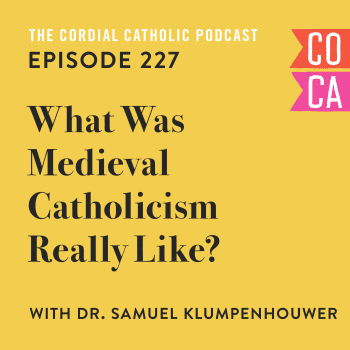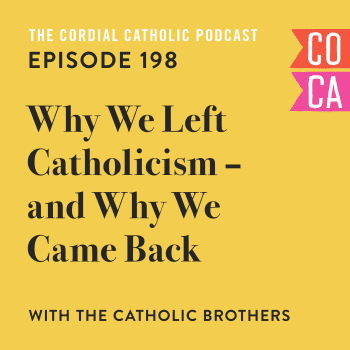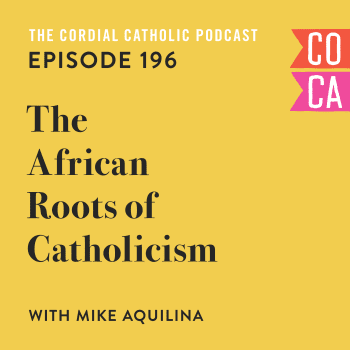
One of the things you might hear a lot about this Easter is why Jesus had to die on a cross.
You may hear that he had to take on all of our sins and receive our punishments; that Jesus became despicable, disgraceful in the eyes of God the Father; and that, at the last hour, the Father abandoned him on the cross to die.
But this is not what the Catholic Church believes.
The Criminal Justice Theory of the Crucifixion
The above description what theologians call the penal substitution theory of atonement.
This theology frames Jesus’ crucifixion as a punishment fitting the crime of humanity—penal, as in the criminal justice or penal system.
Human kind has sinned and someone must take the punishment. Jesus, who is God, becomes that someone.
While it was one of the many ideas proposed by Christian theologians over the last two thousand years to explain the mystery of the crucifixion, it was made most popular by Luther, Calvin, and the Protestant Reformers.
It was John Calvin, and his Reformed theology, that framed this theory of atonement in terms of crime and punishment.
Catholic theologian Dr. Bryan Cross describes it like this,
In the Reformed conception, this is what it means to bear the curse, to bear the Father’s wrath for sin. In Reformed thought, at Christ’s Passion and death, God the Father transferred all the sins (past, present, and future) of all the elect onto His Son. Then God the Father hated, cursed and damned His Son, who was evil in the Father’s sight on account of all the sins of the elect being concentrated in the Son.
But this is not what the Catholic Church believes.
The Catechism of the Catholic Church puts it this way,
Not only would such punishment be unjust, it would also express a very defective view of Christ’s divinity. God the Son cannot be at enmity with God the Father, nor does the Father reject him. Even on the Cross, Christ never failed to be in perfect union with God the Father. (603)
For one reason, among others, believing that God hated, cursed, and damned Jesus doesn’t seem to be compatible with a good, loving and just God. It also doesn’t seem compatible for God—who is Father, Son, and Holy Spirit—to be able to divide his will in a way that He can both love and hate Himself. This latter argument is made pointedly by St. Thomas Aquinas.
The Satisfaction Theory of Atonement
So, what does the Catholic Church believe?
Rather than understanding God punishing Jesus for the sins of all humankind, the Catholic Church understands Jesus’ death on the cross to be a self-sacrificial offering made out of love.
Dr. Cross explains it like this,
In His human will He offered to God a sacrifice of love that was more pleasing to the Father than the combined sins of all men of all time are displeasing to Him, and thus made satisfaction for our sins.
Rather than bearing our punishment, Jesus loved us and that love, offered back to God the Father, satisfied the need for reparation caused by the sins of humankind.
The sins committed by all of humanity, and the sins we continue to commit, drive a wedge between us and God; they interrupt the way in which God has designed us to live in relationship with Him. Far from needing someone to punish, and punishing Christ, the Catholic Church says that on Good Friday Christ emptied Himself for our sake; he gave up us life, which was the ultimate act of love.
This love, you could say, bridged the gap.
Dr. David Anders, theologian and historian, explains Jesus’ sacrifice as being “analogous with the sacrifices of the Old Covenant.”
Under the Old Testament sacrificial system, there was no indication that the bulls, goats, lambs, or even the grain offerings were being punished. Instead, they were indications of self-sacrifice: the Jewish believer was offering up something of great value to themselves as an act of love and reparation towards God.
Christ’s sacrifice, says the Catholic Church, is the ultimate offering up of something of unfathomable value: the life of the God Man Jesus Christ.
The ultimate act of loving sacrifice.
Why Does a Right Understanding of the Cross Matter?
During Holy Week Catholics celebrate, in great detail and liturgical beauty, the crucifixion, death, and resurrection of Jesus. It is the spoke on which the whole wheel of the Church turns, year after year. And so, it’s important that we understanding the why behind the cross in order to more fully appreciate, and live out, the how—the how such an incredible, self-offering, changes everything.
Contrary to the criminal justice version of salvation taught by John Calvin and the Reformers, the Catholic Church does not believe that God sees us as criminals in need of divine punishment. Instead, Jesus, God in the flesh, saw us as wayward, broken, beloved children who He wanted nothing more than to gather up into His arms.
God wanted, and wants still, to live in perfect, loving relationship with us and so He poured out His life in a perfect, self-loving, self-emptying offering for us. To show us that He loves us, and not to merely take on the punishments we deserved.
The distinction, I believe, is a critical.
God is not merely a judge looking for a place to put the blame. God is love—and calls us, those that he poured out Himself for, to be the same.












